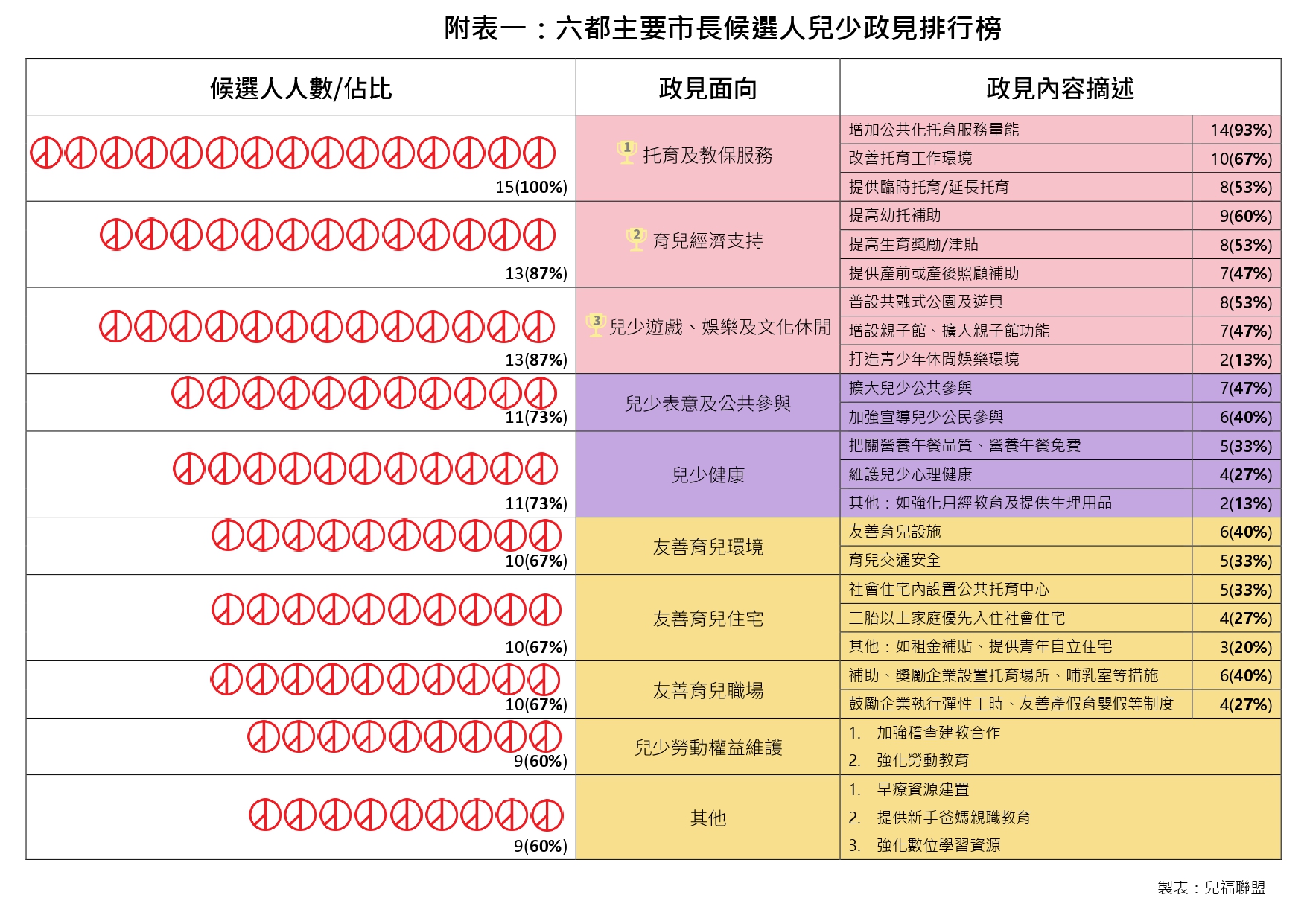
Analysis of Policy Proposals on Child Affairs of Six Special Municipalities Mayor Election
The mayor election is taking place on November 26th, as youngsters under 18 years old can yet to vote, what is the ideal city environment for children and youngsters these future leaders of the cities planned to build? Five organisations which have been focusing on child and youth welfare including Child Welfare League Foundation (CWLF), Child Health Alliance Taiwan (CHAT), John Tung Foundation, Good Neighbors Taiwan, National Taiwan University Children and Family Research Center (NTUCFRC) Sponsored by CTBC (China Securities and Investment Corporation) Charity Foundation, have conducted an analysis of the child affairs policy proposals of the mayoral candidates of the six special municipalities, and also raised three major urges for future mayors including “plan children-related affairs pragmatically,” “make diverse parenting policies,” and “priority of youngsters participation.”
Children affairs-related organisations referred to the list of mayoral election candidates from several major polling institutions and selected fifteen major candidates from the six special municipalities. From September 23rd to October 31st, the organisations collected the “Municipalities Mayor Candidates’ Political Proposal Classification Chart” filled by the campaign teams of each candidate, as well as published information from candidates’ official websites, Facebook fan pages, related news reports, etc., to compile, then review the political proposals put out by the candidates. Proposals in this election including “Parenting Financial Support”, “Nursery and Edu-Care Services”, “Parenting-Friendly Workplace”, “Parenting-Friendly Housing”, “Parenting-Friendly Environment”, “Children’s Gaming, Entertainment, and Cultural Recreation”, “Children’s Right to Be Heard and Public Participation”, “Children’s Health”, “Youths’ Labour Rights Protection”, and “Others” were classified as the ten issues used to examine every candidate’s implementation of children and youth issues in their proposals.
Highly Frequently Discussed Political Proposals
Nursing and Edu-Care Services
- Increase Public Nursing Capacity
All candidates proposed up-scaling nursing and Edu-Care services policies, and over ninety per cent (93%) stated to increase the quota of people accepted in public kindergarten.
- Optimise the Environment of Nursing-related Occupations
Nearly seventy per cent (67%) of candidates raised political proposals of optimising the working environment of nursing service providers, the proposals include a raise in salary for Edu-Care personnel such as expertise bonuses, establishing additional bonuses for long-term workers and lowering the teacher-student ratio; encouraging kindergartens to improve the welfare of Edu-Care givers, and proposing insurance incentives of welfare funds, etc., to motivate these Edu-Care givers to stay for long-term.
- Provide Temporary Caring and Extended Caring Services
There are over fifty per cent (53%) of candidates proposed establishing more temporary caring facilities or combining current parenting facilities with public nursing to provide fixed-location temporary caring services and increase the quota of people accepted in public nursing facilities. As for temporary caring issues, a few candidates called to subsidise Families in Adversity of the temporary caring costs from the government. Moreover, regarding the extended caring services, some candidates proposed using governmental funding to support the service; expanding the service to a broader public who needs the assistance, for instance, single parenting families, and extending business hours of the temporary care service (prolonging from eight o’clock till eleven o'clock) and etc.
Parenting Financial Support
Eighty-seven per cent of candidates raised parenting financial support-related proposals, which can be subdivided into three groups:
- Increase childcare subsidization
Sixty per cent of candidates proposed to increase childcare subsidization for residents in that city with children 0 to 2 years old. The range of adjustment is from 1,200 NTD to 5,500 NTD, the average additional amount is 2,575 NTD. For residents with children 2 to 6 years old, candidates proposed to increase monthly subsidization for kindergarten childcare, the minimum amount of 833 NTD and maximum of 4,553 NTD, the average additional amount is 2,569 NTD. - Increase fertility perks/bonuses
Fifty-three per cent of candidates raised proposals on a one-time birth perk/subsidy, more subsidies for parents with more births. Taking the first child as an example, the minimum childbirth subsidy is 10,000 NTD, the maximum is 50,000 NTD, and the average additional amount is 20,000; for the second birth, the least amount of birth subsidy is 12,000 NTD and the minimum for the third birth is 20,000 NTD, maximum for both is 50,000 NTD. - Provide prenatal and postnatal care subsidisation.
What is also worth noticing is that besides the fertility perks, there is also forty-seven per cent of candidates raised concerns about prenatal and postnatal care subsidisation. Prenatal subsidisation, for example, subsidises or provides discounts on transportation for pregnant women to prenatal check-ups, to reduce the transportation expenses for these women. As for postnatal care, some candidates proposed supporting confinement subsidisation, to-door confinement services, home-based child-rearing instructors, etc. In recent years, city governments brought out a one-time maternity bonus/perk policy, nonetheless, the actual effect on raising the fertility rate remains limited. In this evaluation, it’s found that more candidates are prone to focus on pregnancy welfare, and it is worth encouraging that they proposed to provide more pre and postnatal subsidisations and relevant services.
Children’s Gaming, Entertainment, and Cultural Recreation
On the other hand, according to the CWLF “2020 Report of Taiwan Children’s Leisure and Free Gaming Situation Survey,” 54.3% of youths often spend time at parks, embarkments and other outdoor venues; 38% of them go to supermarkets, shopping malls, department stores and convenience stores or other indoor places. However, few of the places mentioned were designed exclusively for children and youths, thus might not be able to satisfy the requirements targeting on children’s gaming and leisure. Director Li at CWLF urged all candidates to establish more parent-child venues, children’s playgrounds, and other facilities. It is also crucial to consider the entertainment needs of children and youths of different age ranges to create more diverse and friendly public venues, making parks, restaurants, and more places for children and youths to enjoy leisure time.
Frequently Discussed Political Proposals
Children’s Right to Be Heard and Public Participation
Health of Child
On the side, there is nearly thirty per cent (27%) of candidates raised proposals about mental health issues such as establishing free fixed-point psychological counselling services and increasing the number of the school psychologist and social workers, these proposals are worthy of recognition, but other candidates’ political proposals on children’s mental health are relatively vague. CWLF Director Li stated that compared with the tripled suicide rate among adolescents in Taiwan within a decade, the “2022 Taiwan Children’s Mental Health and Counselling Resources Survey” by CWLF has pointed out that problems, for instance, insufficient campus mental health publicity, insufficient accessibility of counselling resources on campus, and limited online counselling resources, etc., Li urges the future mayors of the six special municipalities to strengthen prevention publicity and activities related to children’s mental health, and devote more resources to increase the accessibility of such services.
Director Shen Chiung-Tao at NTUCFRC also imposed the close connections between parent-child relations and children’s mental health. It was found according to the centre’s long-term analysis of Taiwanese children that those who suffered from neglection, childhood trauma (e.g. domestic violence) or bullying, has a higher possibility to develop internet addiction, self-harming and hurtful behaviours. Shen urges the candidates to pay attention to the physical and mental health of children, improve parental knowledge through family education, help children practice emotional management through life skills training, and positive interpersonal interaction, etc., so can increase resilience and reduce physical and mental health risks, and implement the promises of the “Convention on the Rights of the Child” on the rights to health, protection, survival and development.
Less Frequently Discussed Political Proposals
Friendly Parenting Environment
Friendly-Parenting Housing
Over thirty per cent (33%) of candidates raised proposals to establish more social residents with public nursing centres within. Nearly thirty per cent (27%) put forward proposals that parenting families with two or more children could get priority to be accepted by social houses. However, the slow-going construction of social residents made the urgent needs of families with children unable to fulfil. Corresponding to the latest housing price affordability index released by the Ministry of the Interior in October this year, the national housing loan burden rate in the second quarter this year was 39.62%, an increase of 1.27% from the previous quarter, meaning that nearly 40% of the household income of homebuyers must be spent on paying mortgages, which is a new historic high. Obviously, the misery index of homebuying had spiked once more. As housing is a major concern to many parents with children, sadly the candidates paid little attention to the housing needs of parenting families.
Friendly Parenting Workplaces and Youths’ Labour Rights Protection
In this analysis, it is discovered that forty per cent of candidates proposed to encourage enterprises to set up nursery places or breastfeeding rooms through subsidies and rewards; another twenty-seven per cent of candidates proposed to encourage enterprises to implement flexible working hours, friendly maternity and parental leave. Director Shen at NTUCFRC suggested that local governments should fundamentally create a “Parenting-Friendly Workspace” to motivate couples to have children. Shen expressed her contend to see candidates propose to increase various subsidies and increase family support services, however, the work pressure of parents or primary caregivers is a more important issue to lay an eye on. It is prompted that employers increase options for flexible working hours and work styles. According to NTUCFRC’s empirical research, parents’ work style significantly impacts children’s lifestyles. Compared with other types of working hours, children whose caregivers conduct atypical professions are more likely to have irregular resting and diet habits, which will trigger a serious negative impact on children’s physical and mental development.
Proposals cared the least being “Youths’ Labour Rights Protection” even though there are some candidates called to enhance the inspection of cooperative education and strengthen labour education, but only few did. Generally speaking, candidates in this election rarely raise proposals on eliminating obstacles to youth employment and preventing youth from being exploited by employers, or similar issues. It is expected that more mayoral candidates of the six special municipalities could pay more attention to the protection of children’s labour rights and interests and put forward more pragmatic measures to make improvements.
Children’s affairs focusing NOGs put forward three major demands, calling on the future mayors of the six special municipalities to fulfil their children and youths-related political proposals
The mayoral election will be taking place on November 26th, five NGOs working on children and youths welfare including Child Welfare League Foundation (CWLF), Child Health Alliance Taiwan (CHAT), John Tung Foundation, Good Neighbors Taiwan, National Taiwan University Children and Family Research Center (NTUCFRC) Sponsored by CTBC (China Securities and Investment Corporation) Charity Foundation are collectively appealing to the future mayors to fulfil the three major demands after them taking office, which are “be pragmatic on children and youths-related proposals”, “diversify childcare policies”, and “put children and youths participation on priority”.
- Be pragmatic on children and youths-related proposals, not only giving financial support but also beefing up, and giving priority to filling the gap in children’s policies.
Some of the six special municipalities’ mayoral candidates put forward political proposals regarding children’s welfare, however only declarative concepts or slogans, but not substantive connotations. On the whole, most proposals emphasise cash subsidies, as many as 87% of candidates promised to increase childcare-related subsidies in an attempt to attract more parents’ votes. Children and youth-oriented NGOs are concerned that keep increasing cash subsidies would only crowd out the budget for promoting other varieties of services for children. The NGOs call on future mayors to not only add icing on the cake but to help in one’s hour of need, the priority should be put on filling up the gaps in policies and the actual situation, which includes implementing the quality of childcare services and keeping the safety of childcare service providers in check; strengthening the inspection, counselling and withdrawing mechanism of Edu-Care service providers; enriching the resources for children’s physical and mental health promotion; expand recreational spaces for youngsters, and strengthen the protection of children’s labour rights and interests, etc.
- Diversified childcare policies to make the six special municipalities all-around parenting-friendly model cities.
Taking a comprehensive look at the candidates' child-rearing political proposals, most remain focused on childcare and Edu-Care insurance services, and financial support for child-rearing. In spite of that, related supports for instance parenting-friendly environment, which parents are concerning as well, were less valued by candidates. Compared with others, the six special municipalities with more financial resources, the mayors ought to focalise on the needs of parenting families with children at different life stages, devote to generalise parenting-friendly facilities, improve child-friendly transportation environment, optimise parenting-friendly housing policies, create more child-rearing friendly workplaces, and other supporting mechanisms. In addition to providing parenting support for families with children under six years old, it is also suggested to expand the beneficiaries of childcare policies to families with school-age children over six and youngsters from twelve to eighteen years old, so as to build the six special municipalities models cities for all-round childcare friendly cities.
- Given priority to children’s participation, accommodate children’s opinions when making policies for children and youths, to establish child-friendly cities.
Referring to the “Child-Friendly City” proposed by the United Nations Children’s Fund (UNICEF), NGOs suggest that future mayors of the six municipalities should devote themselves to the maintenance and implementation of Children’s Right to Be Heard when it comes to municipal governance and to facilitate children’s civic participation. When making decisions on policies related to children’s rights and interests, there should be a permanent mechanism to consult children’s opinions; implement assessments of policies and regulations for the possible impacts on children’s rights and interests; enhance education and publicity on children’s rights, so that children, parents and all others would respect children’s human rights; moreover, the future mayors should also refer to the United Nations (UN) Convention on the Rights of the Child (CRC) and relevant regulations, strategies proposing ought to base on children’s perspectives and needs, raising specific strategies for creating a child-friendly environment, so the six special municipalities could be upgraded to child-friendly cities that protect children’s rights, so to be in line with international standards.



